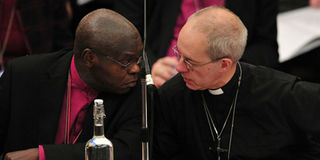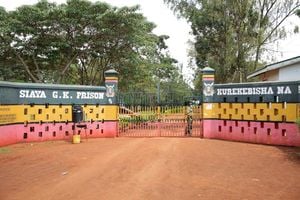Church of England sets aside Sh1.8 billion for slave trade fund

Justin Welby, the Archbishop of Canterbury (right) speaks with John Sentamu, the Archbishop of York, during the Church of England General Synod on November 20, 2013.
What you need to know:
- Two years ago, Harvard University announced a fund to address issues around slave trade.
- The report urged the church to speed up the timeline of the fund to make it accessible later this year.
There is renewed hope for victims of slave trade in Africa after The Church of England, the mother church of the global Anglican Communion, set aside a Sh1.8 billion fund to pay for its historical ties to the Atlantic slave trade.
The Transatlantic Slave Trade was an oceanic trade in African men, women, and children that lasted from the mid-sixteenth century until the 1860s.
It involved European traders loading captured Africans at dozens of points off the continent’s coast, from Senegambia to Angola and round the Cape to Mozambique, to work on plantations in Europe and the Americas.
The Sh1.8 billion allocation is part of The Church of England's commitment to the "Fund for Healing, Repair and Justice" but a new report urges the amount to be raised to Sh182 billion.
The Church of England said it had accepted the report, media outlets— including the Guardian , Premier Christian News and the Christian Post— reported.
Released Monday by an oversight group of independent advisers, the report suggested that the Church of England's commitment was not sufficient "relative either to the scale of the [commissioners'] endowment or to the scale of the moral sin and crime," according to The Guardian.
And in a quick rejoinder, former Archbishop of Canterbury (the head of the church) Rowan Atkins suggested that “Britain can draw valuable lessons from the Bible's candid approach to historical issues such as slavery.”
Premier Christian News reported that according to Williams, entrenched "violently self-justifying national narratives" worldwide hinder a truthful reckoning with the less savoury aspects of respective countries' pasts.
Lord Williams, known for his theological expertise and authorship, has a history of addressing historical slavery issues.
In 2006, during his tenure as archbishop, he urged the Church to acknowledge its involvement in transatlantic slavery, leading to a formal apology by the General Synod, the Church's legislative body.
Two years ago, the British branch of the Yearly Meeting of Friends (Quakers) announced a decision to make reparations on slave trade and colonialism.
In April of the same year, Harvard University announced a fund to address issues around slave trade which some of the people associated with it are said to have taken part in.
The advisers’ report urged the Church of England to work together with other organisations to set up the hefty fund, which will be used worldwide to provide land grants and invest in black-owned businesses that focus on education, economic empowerment, and health outcomes, according to a statement from the Church of England.
The report urged the church to speed up the timeline of the fund to make it accessible later this year, which is more quickly than the nine years initially planned.
It also called on the denomination to "fully acknowledge and apologise for the harms caused by its historic denial that black Africans are created in the image of God, for its deliberate actions to destroy diverse African religious belief systems, and to facilitate work that builds the spiritual connection of Africa and the African diaspora with the gospel and the diverse spiritual practices of African forebears."
The report is the result of an investigation that began in 2023 and found that the CofE invested £406,942 (or approximately £724 million today) in the South Sea Company, which reportedly transported about 34,000 slaves in terrible conditions for over 30 years.
A spokesperson for the church said it does not intend to balloon the fund to the recommended £1 billion but expressed hope that the initial £100 million would serve as a seed investment that will eventually grow, according to The Guardian.





